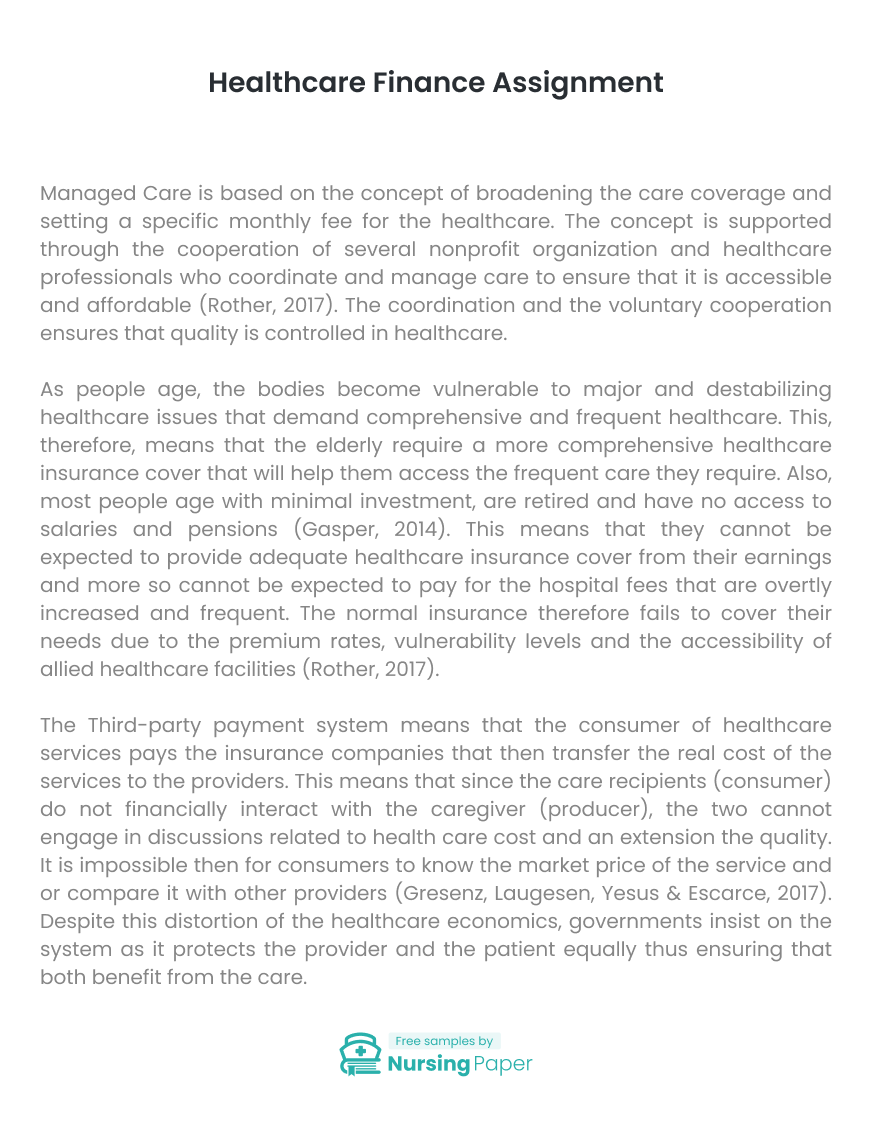
Healthcare Finance Assignment
Introduction
Managed Care is based on the concept of broadening the care coverage and setting a specific monthly fee for the healthcare. The concept is supported through the cooperation of several nonprofit organization and healthcare professionals who coordinate and manage care to ensure that it is accessible and affordable (Rother, 2017). The coordination and the voluntary cooperation ensures that quality is controlled in healthcare.
As people age, the bodies become vulnerable to major and destabilizing healthcare issues that demand comprehensive and frequent healthcare. This, therefore, means that the elderly require a more comprehensive healthcare insurance cover that will help them access the frequent care they require. Also, most people age with minimal investment, are retired and have no access to salaries and pensions (Gasper, 2014). This means that they cannot be expected to provide adequate healthcare insurance cover from their earnings and more so cannot be expected to pay for the hospital fees that are overtly increased and frequent. The normal insurance therefore fails to cover their needs due to the premium rates, vulnerability levels and the accessibility of allied healthcare facilities (Rother, 2017).


The Third-party payment system means that the consumer of healthcare services pays the insurance companies that then transfer the real cost of the services to the providers. This means that since the care recipients (consumer) do not financially interact with the caregiver (producer), the two cannot engage in discussions related to health care cost and an extension the quality. It is impossible then for consumers to know the market price of the service and or compare it with other providers (Gresenz, Laugesen, Yesus & Escarce, 2017). Despite this distortion of the healthcare economics, governments insist on the system as it protects the provider and the patient equally thus ensuring that both benefit from the care.
1. Gasper, J.T. (2014). The Politics of Denying Aid: An analysis of Disaster Declaration Turndowns http://www.andrew.cmu.edu/user/gasper/WorkingPapers/turndowns.pdf
2. Gresenz C, Laugesen M, Yesus A, Escarce J. (2017). Relative Affordability of Health Insurance Premiums under CHIP Expansion Programs and the ACA. Journal Of Health Politics, Policy & Law, 36(5):859-877.
3. Rother J. (2017). Top of the Administration’s Agenda: Stem the Rising Cost of Healthcare. Generations, 40(4):30-37.



The download will start shortly.

The download will start shortly.
 Subject:
Health and Social Care
Subject:
Health and Social Care  Number of pages: 2
Number of pages: 2  Subject:
Health and Social Care
Subject:
Health and Social Care  Number of pages: 3
Number of pages: 3  Subject:
Health and Social Care
Subject:
Health and Social Care  Number of pages: 3
Number of pages: 3  Subject:
Health and Social Care
Subject:
Health and Social Care  Number of pages: 4
Number of pages: 4  Subject:
Medicine
Subject:
Medicine  Number of pages: 3
Number of pages: 3  Subject:
Medicine
Subject:
Medicine  Number of pages: 4
Number of pages: 4  Subject:
Health and Social Care
Subject:
Health and Social Care  Number of pages: 4
Number of pages: 4  Subject:
Health and Social Care
Subject:
Health and Social Care  Number of pages: 10
Number of pages: 10  Subject:
Medicine
Subject:
Medicine  Number of pages: 1
Number of pages: 1  Subject:
Medicine
Subject:
Medicine  Number of pages: 5
Number of pages: 5  Subject:
Nursing
Subject:
Nursing  Number of pages: 2
Number of pages: 2  Subject:
Medicine
Subject:
Medicine  Number of pages: 4
Number of pages: 4  Subject:
Nursing
Subject:
Nursing  Number of pages: 3
Number of pages: 3  Subject:
Health and Social Care
Subject:
Health and Social Care  Number of pages: 13
Number of pages: 13  Subject:
Health and Social Care
Subject:
Health and Social Care  Number of pages: 3
Number of pages: 3 
